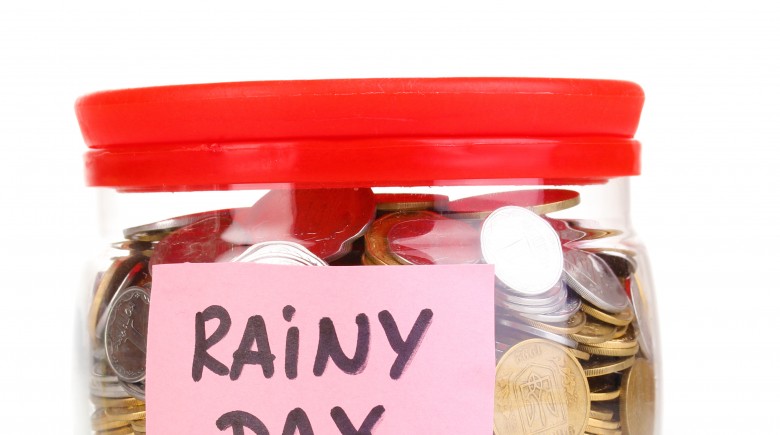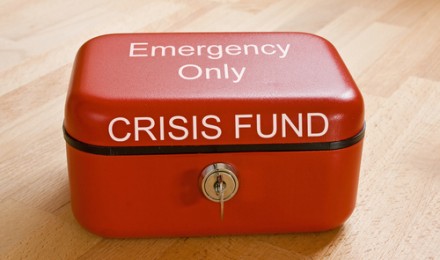Many people found out the hard way what happens when you do not have enough money put away in a Rainy Day Fund, or in an Emergency Fund as they are often called. During the financial crisis a few years back, many individuals lost their jobs, and were not able to find new ones for many months. Here are some tips on how to figure out how much you need for the next rainy day.
It Takes Longer to Find a New Job
New jobs are not as readily available as they once were. This means that it is going to take longer to replace the job you lost, and you may also have to take a cut in pay even when you do find one. It could easily take up to nine months (or more) to get a decent new job. BankRate.com reports that Gail Cunningham from the National Foundation for Credit Counseling in Washington, D.C., says that if you don’t have this much in savings, you could be in financial trouble if a job is lost.
Although it is not that likely to happen, it is possible that both spouses could lose their jobs at about the same time. If the home depends on both incomes to make ends meet, then even more money will be needed to be put into your Rainy Day Fund. Even if one spouse is able to get a job soon, it still means that the debt will be increasing every week. This makes it necessary to put a little more into the account.
More Money Is Needed If There Is a Mortgage
During the last financial crisis, about 16 percent of people with a mortgage were late on making a mortgage payment, says WallStreetonParade.com. Their information came from a report from the Financial Crisis Inquiry Commission, which also said that 10 percent had been late more than once within two years. Being able to cover your mortgage is important so that you can keep a roof over your head and keep your credit intact.
Prepare for Smaller Needs from Your Rainy Day Fund
One thing that will require you to need a larger Rainy Day Fund is if you have a lot of credit debt. If you pay cash as often as possible, and keep your debt minimal or even non-existent, then a larger Emergency Fund will not be necessary. Having current debt means that you need to reduce it as much as possible as fast as you can, but you still want to put some money away.
Use Your Money Wisely
FINRA.org also advises that you use money wisely and shop around before buying to get the best deals. This includes places where you are going to save and invest your money, such as in a 401k plan.
You can help protect the assets you already have if you research the organization first. Maintaining health insurance can help keep medical costs down, and diversifying your investments will enable you to keep a larger portion of that money in the event one or two industries suffer financially.
Understand Your Monthly Bills
When people calculate just how much money they need in an Emergency Fund, it is easy to underestimate this amount. You can understand it better if you look over your actual finances for a year, and then make the determination. Families often have bills that are not due on a regular basis, and these can really cause problems later on if not taken into consideration. Overall, most people will need to have between three- to nine-months’ worth of savings in their Rainy Day Fund to weather the storm.
Many people found out the hard way what happens when you do not have enough money put away in a Rainy Day Fund, or in an Emergency Fund as they are often called. During the financial crisis a few years back, many individuals lost their jobs, and were not able to find new ones for many months. Here are some tips on how to figure out how much you need for the next rainy day.
It Takes Longer to Find a New Job
New jobs are not as readily available as they once were. This means that it is going to take longer to replace the job you lost, and you may also have to take a cut in pay even when you do find one. It could easily take up to nine months (or more) to get a decent new job. BankRate.com reports that Gail Cunningham from the National Foundation for Credit Counseling in Washington, D.C., says that if you don’t have this much in savings, you could be in financial trouble if a job is lost.
Although it is not that likely to happen, it is possible that both spouses could lose their jobs at about the same time. If the home depends on both incomes to make ends meet, then even more money will be needed to be put into your Rainy Day Fund. Even if one spouse is able to get a job soon, it still means that the debt will be increasing every week. This makes it necessary to put a little more into the account.
More Money Is Needed If There Is a Mortgage
During the last financial crisis, about 16 percent of people with a mortgage were late on making a mortgage payment, says WallStreetonParade.com. Their information came from a report from the Financial Crisis Inquiry Commission, which also said that 10 percent had been late more than once within two years. Being able to cover your mortgage is important so that you can keep a roof over your head and keep your credit intact.
Prepare for Smaller Needs from Your Rainy Day Fund
One thing that will require you to need a larger Rainy Day Fund is if you have a lot of credit debt. If you pay cash as often as possible, and keep your debt minimal or even non-existent, then a larger Emergency Fund will not be necessary. Having current debt means that you need to reduce it as much as possible as fast as you can, but you still want to put some money away.
Use Your Money Wisely
FINRA.org also advises that you use money wisely and shop around before buying to get the best deals. This includes places where you are going to save and invest your money, such as in a 401k plan.
You can help protect the assets you already have if you research the organization first. Maintaining health insurance can help keep medical costs down, and diversifying your investments will enable you to keep a larger portion of that money in the event one or two industries suffer financially.
Understand Your Monthly Bills
When people calculate just how much money they need in an Emergency Fund, it is easy to underestimate this amount. You can understand it better if you look over your actual finances for a year, and then make the determination. Families often have bills that are not due on a regular basis, and these can really cause problems later on if not taken into consideration. Overall, most people will need to have between three- to nine-months’ worth of savings in their Rainy Day Fund to weather the storm.





